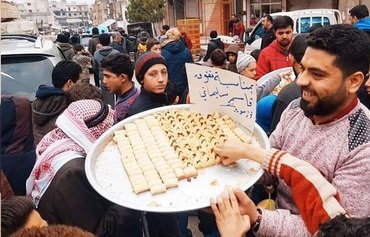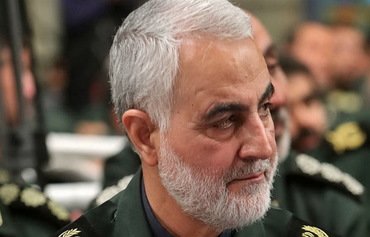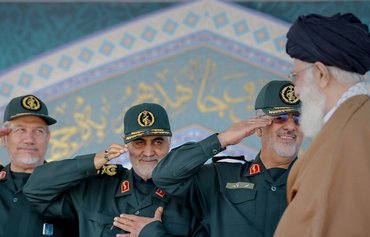Iran-backed militias operating in Syria have been dealt a severe psychological blow with the loss of Islamic Revolutionary Guard Corps Quds Force (IRGC-QF) commander Maj. Gen. Qassem Soleimani, Iranian affairs experts said.
As head of the Quds Force, which oversees the IRGC's external operations, Soleimani was directly responsible for these militias, they told Diyaruna, and without his oversight, their influence and effectiveness are sure to decline.
The psychological factor is part of this equation, since Soleimani has long been vaunted in Iranian media for his political and military prowess -- and yet he was eliminated very easily, they said.
His death will heavily impact the operation of Iran-backed militias in Syria.
The Iranian media machine's efforts to aggrandise Soleimani and portray him as a hero have backfired, said Iranian affairs researcher Fathi al-Sayed.
His death has significantly affected morale among Iran-aligned militiamen in Syria, he said, "because if the man at the helm of their organisations was killed, what fate awaits them?"
Psychological impact
Soleimani was extremely invested in his media image, al-Sayed noted.
"After staying out of sight for a long period of time, he ramped up his media appearances in combat zones in Syria and had many photos and videos taken of himself with elements of IRGC-backed militia there," he said.
Upon his death, "the huge aura he surrounded himself with burst with a bang", he said, pointing out that this will in turn reflect negatively on the strong image these militias have sought to project and impair their effectiveness in Syria.
Even though Esmail Qaani was quickly appointed as the new IRGC-QF commander, Iran-backed militias in Syria will be severely impaired, as Soleimani had directly supervised them, said terror group specialist Yahya Mohammed Ali.
Soleimani personally oversaw Syrian, Iraqi, Pakistani and Afghan militias in Syria, he told Diyaruna, noting that his elimination "will instill fear in the hearts of the elements of those militias".
"It makes them realise they can be targeted and killed at any time," Ali said.
Though Soleimani was subordinate to officials in Tehran, "outside Iran he acted with absolute authority", Iranian affairs researcher Sheyar Turko told Diyaruna.
His death will diminish the prestige of Iran-backed militias operating in Syria and also will weaken them, he said, pointing out that this will in turn affect their recruitment and retention efforts.
Syrians express relief
"We thank God for his assassination," Ismail al-Asali told AFP on January 10th.
Al-Asali survived a vicious November attack on the northern Syrian displacement camp of Qah that was carried out by Iran-backed forces stationed in Jabal Azzan in the countryside of Aleppo.
The strike killed al-Asali's wife, brother and nephew, he said, and his one-year-old son lost a leg. Al-Asali himself was wounded.
"Not a single massacre has happened in Syria, without [Soleimani] partnering with the regime and Russia in the killing of Syrian people," al-Asali said.
The Syrian opposition and displaced Aleppo residents accuse the former IRGC-QF commander of masterminding a brutal operation that killed hundreds and displaced thousands of the residents of the city of Aleppo.
"Soleimani was the most influential element of this campaign," said displaced Aleppo native Abu Ahmed. "Before he came we managed to hold up our defences for five years."
"I am happy about the killing of this criminal who was behind the displacement of thousands of people," he added.
As the battle for Aleppo neared its end in 2016, photos of Soleimani walking in the streets of the city circulated on social media -- a move Abu Ahmed said added insult to injury.
"It was not enough for him to just kill people, he also had to walk over our blood and our wounds," he told AFP.
"The death of Soleimani is a victory over injustice," he said. "Every tyrant should meet the same fate."

![IRGC Quds Force commander Qassem Soleimani, who was killed in a US air strike in Baghdad on January 3rd, is seen near the Syrian city of Albu Kamal in 2017. [Photo courtesy of Syria Call Facebook page]](/cnmi_di/images/2020/01/23/22077-Syria-IRGC-Soleimani-600_384.jpg)






